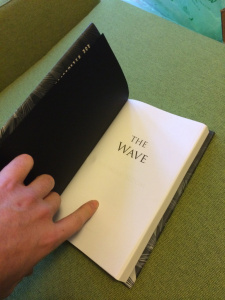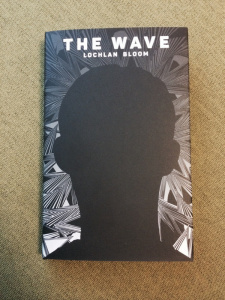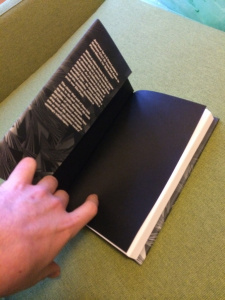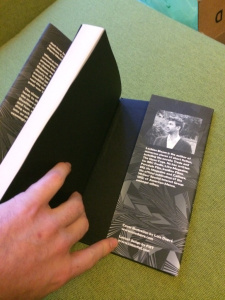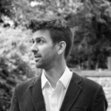Lochlan Bloom's Blog, page 3
June 1, 2017
I am talking about The Wave and the writing process on 17th June following the City of Stories event
I am pleased to be talking at Walthamstow library on 17th June as part of a day of creative writing events that will include interviews and workshops for writers and those interested in literary fiction. [image error]
I will be speaking at 3pm with Jaimie Batchan about the The Wave and the journey to write it and get it published. The event will include some readings from The Wave, followed by Q&A and refreshments.
In the morning there will be free workshops as part of the City of Stories event. The workshops are open to all levels – whether you write stories already or are just starting and by coming along to a workshop, you can enter the City of Stories competition. If your story wins, it will be published in the City of Stories booklet. You will get a place at a writing masterclass and invited to attend a celebration event.
For more details and to sign up for my talk visit eventbrite here: https://www.eventbrite.co.uk/e/local-author-talk-with-lochlan-bloom-at-walthamstow-library-tickets-34793861376
and for the City of Stories event: https://www.eventbrite.co.uk/e/city-of-stories-walthamstow-library-waltham-forest-tickets-33897549483?aff=es2


May 5, 2017
Modern Reading
(originally published in Hourglass Literary Magazine https://hourglassonline.org/news/modern-reading-by-lochlan-bloom )

Credit: David Evers
There is a group, let us call them the anti-fictionists, that proclaims the death of fiction. They call for an end to the make-believe, the fake, the imaginary. Who needs fiction, these anti-fictionists say, when there is the scientific method, progress, development.
We may be a society of readers but how much of that time is spent reading books? Certainly it seems the traditional novel or short story collection has fallen by the wayside. Is there really any need to read fiction?
It is true that we are reading more than ever, hour after hour spent staring at screens, reading, scrolling, scanning, reading, reading, reading… but the role of fiction in the modern world had never seemed more debatable.
This group, the anti-fictionists, believe that if fiction is needed at all it should be a commodity. A product that can be pushed into the idle hours of our day, marketed as a consumable, valued according to economics.…continue reading on Medium.


March 20, 2017
One truly serious philosophical problem
(originally published on 33rd Square www.33rdsquare.com/2017/03/machine-learning-one-truly-serious.html)

The Triumph of Death by Pieter Bruegel the Elder
Machine learning is in the news again this week as it was announced that systems can now surpass humans at identifying those at risk of taking their own life.
Following a seemingly endless series of breakthroughs in recent years the news may seem like just one more thing that computers can now do better than humans but is there a deeper existential significance to the fact that AI now knows more about the likelihood someone might end their life than we do?
In his 1942 essay, The Myth of Sisyphus, Camus, calls suicide the “one truly serious philosophical problem” and yet, even as suicide rates are rising in many Western societies, it seems we are stubbornly……continue reading on Medium.


March 8, 2017
The Short Story Interview: Lochlan Bloom
Originally published on The Short Story
Interview by Rupert Dastur
Hi Lochlan, thank you for speaking to us. Could we begin by asking about your development as a writer – when did the craft switch from hobby to profession, and what have been the major landmarks in your development?
Hi! That’s a good question. It’s hard to put my finger on an exact switch. The idea of hobby versus profession is something I struggle to fit to the act of writing.
There seems to be a general assumption that if you are getting paid to do something then it is a profession and if you are not getting paid then it is a hobby but you don’t have to look too far to realise there are plenty of people out there getting paid exorbitant amounts for very little ‘work’ and others producing very serious writing for next to nothing.
I was paid as a writer of non-fiction and journalism before making any money with my fiction writing but that never made one seem like a ‘profession’ and the other a ‘hobby’.
Did you study literature at university? Your debut certainly gives that impression!
Thanks. I studied Physics but I’ve always written and read fiction so my fiction-writing developed relatively organically. Physics and fiction can at times be positioned as polar opposites- the hard-scientific approach versus the wooly and imaginary – but literature and mathematics often approach some of the same sorts of questions about the world. Hopefully The Wave captures some of those.
Why do you think writing is important?
At a very simplistic level I guess it is important as without it we wouldn’t have anything to read. The two processes of reading and writing are obviously linked and we need both if we want to continue that part of who we are.
By ‘that part of who we are’ are you referring to the part of us that is the story-teller or reader?
More in the sense of who we are as a species, culture, etc. Writing has very rapidly become pretty much the primary way we interact. In a relatively short period of time we have replaced a huge amount of our social and business interactions with various forms of text – whether email, online media, Whatsapp, messenger etc…
It’s hard to imagine society without the written word but if we had to somehow go backwards and rely only on spoken/recorded language (and perhaps written mathematics) it seems clear we would all be very different!
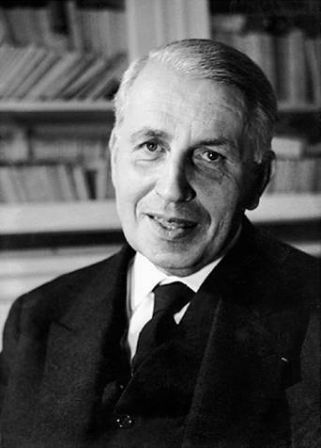
Maurice Blanchot
Obviously when you write a Whatsapp message it is normally with a different intention than writing fiction but the fact that writing is so prevalent does make for a greater continuum of written words. Maurice Blanchot talks about literature beginning at the moment when it becomes a question and I think that some kind of intention to question the world is what drives the most interesting fiction.
Literature is a part of the way we construct the world around us – a great piece of writing can absolutely change your perception – and it is unique in that it’s one of the few art forms that is in a way divorced from the senses. There is an immediacy, a real, instant feeling you get from watching or listening to dance, music, film, sculpture, or artworks on a wall in a gallery. They are all experienced directly via the senses in a way that is not present in reading.
Literature is this weird cryptographic-artform whereby you stare at a page of symbols and ‘something’ appears. If you watch a theatre play or listen to a song in a language that you don’t understand you might not get the full significance but it is never completely obscure. The body language of the actors, the tone of voice, the pitch of the instruments all give an immediate sense of the piece.
If you contrast that with opening a book in a foreign language there is obviously a huge difference. If I open a book of Japanese prose I have literally no idea what its about. There may be a tactile element to the book and you might be able to say something about typography or page layout but I would argue that effect is unlikely to provoke much feeling in the reader.
Other art forms are at one remove from reality – a reflection of reality created by the musician, painter, etc, – but literature is at a double remove – hidden behind this process of deciphering hieroglyphs. I think in a strange way it is this double remove from the real world that gives really good literature its unique lucid quality. Im sure academics have explored this in more depth elsewhere but would be great to read some more on this topic – if any of your readers know any more on this from a neuroscience perspective get in touch!
That’s interesting – I’ve read a lot about reading being a form of interpretation – of all viewing, in fact, as a form of interpretation – of a decoding of signs and symbols through the lens of our own personal psychology and knowledge of the world. Is there a difference between listening to a story and reading it, in so far as levels of remove are concerned?
Yes I think that’s an interesting question. I would say there probably is. There are definitely similarities between reading and listening to a story but the difference with oral storytelling is that it is still tied to our sense of sound (and sight, through body language, if the teller is in front of us).
If we listen to a storyteller in a foreign language we might get some sense of the flow and the emotion even if we don’t understand the words. (although I guess it is possible to mislead the listener and give false emphasis if they don’t understand the words.)
Writing in contrast has none of these sensory clues to ‘flesh out’ the story. If you take this alongside the explosion of writing in modern culture I think it creates some interesting questions about our society and where it is heading. Baudrillard’s concept of sign-order and simulacra and the relationship between reality and symbols for instance is only really possible due to this strange disassociation
from reality that writing possesses.
I also wonder if music also requires a degree of contextual understanding – throughout the world there must be many different variations on what constitutes ‘music’, let alone whether it is good or not.
There is certainly a high degree of contextual understanding involved in appreciating music, as with other art forms, but in each case there is still an immediate sensory element. We can tell for instance that animals react to different forms of music even though they are probably not appreciating it in the same way we do.
You’ve published a number short fiction pieces in a variety of places – one of which we reviewed last year – what attracts you to the short form?
I’m not sure I am attracted to the form so much as some stories somehow end up that length. When writing there is a sense that the length of each scene, plot point, description, etc is already dictated to some extent.
Too short and it does not capture the full effect, too long and it loses the magic.
I might compare it to using a lens to focus an image on a wall. The sharpness of the image depends on the focal length of the lens and the sweet spot depends on the lens itself not the person holding it.

The Open cage by Lochlan Bloom
I was listening to Bill Bryson’s A History of Nearly Everything the other day and there was a passage about sixteenth century French scientists who travelled to South America and generally caused havoc wherever they went – I couldn’t help notice some of the parallels with your chapbook ‘The Open Cage’ and wondered if the story had been inspired by such excursions?
I’ve not read A History of Nearly Everything but certainly ‘The Open Cage’ was influenced by other readings of those early explorers in South America. The conquistadors had this fascinating mix of blood-thirstiness and violence with a deeply held belief in a divine being who exemplified and expounded meekness and sacrifice.
On a related note I recently read César Aira’s short novella An Episode in the Life of a Landscape Painter which I really enjoyed and brilliantly mixed old-world scientific resolve with surrealistic, almost pagan imagery.
Aside from short prose, you’ve also written for the screen and earlier this year your novel, The Wave, was published. How do these different forms relate to one another, and what are their varying strengths and weaknesses?
For me the form, like the length of a piece of writing, is to some extent determined by what feels natural for the story itself. I might initially try writing something as prose and end up putting it to one side because I feel it’s not working. It might sit there for a while until I get the idea to try writing a piece of dialogue between two of the characters in script format and suddenly it clicks.
With The Wave I knew from the start that I wanted to include certain sections in script format to highlight the distinction between the separate story strands. I wanted to create a novel that constantly brings the reader out of the narrative, where the reader is not only questioning the characters motivations but the text itself. Hopefully that works in the end and it delivers something that a potboiler that you can ‘lose yourself’ in doesn’t but I realize it could well be irritating for a lot of readers too! 
March 2, 2017
The Slave Traders
It has been known for several years now that slave traders are operating in this area but despite the best attempts of the police captain and his men it has proven impossible to catch any of them.
Some people have blamed this on poor Captain Jacobs himself, suggesting he is corrupt, but this is unfair on the poor man as he is no more involved with the slave traders than the rest of us.
Wherever you go you will hear people talking of them. They are discussed everywhere in this town — from the bars to the library, the primary school to the prison cell — but still no one will come out and name names.
Nearly everyone, when the subject is brought up of an evening, will lay claim to some familiarity, yet when they are called upon as witnesses they crumble and talk incoherently leaving the jurors unimpressed. Some amongst us even pretend that the traders might have left the town or else claim that there have never been any slave traders here at all.
They point out, rightly enough, that……continue reading on Medium.
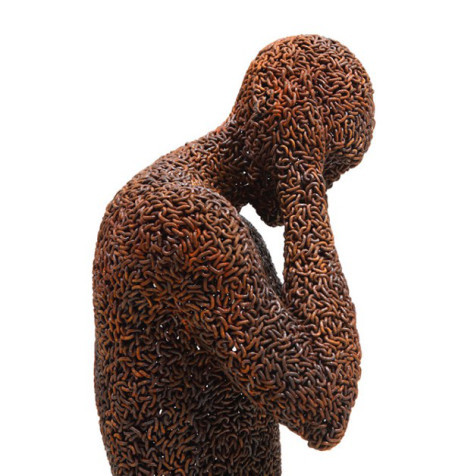
Credit: Young-Deok Seo
February 26, 2017
The Parcel
It is calm, there are no puzzles, the parcel arrives. 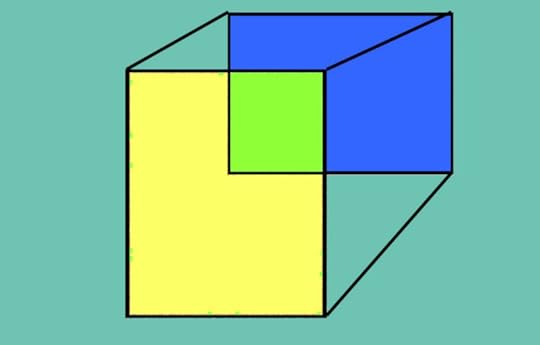
It is not so big, perhaps the size of your head.
It is a box, a sturdy cardboard box. There is a stamp on it but the postmark is illegible. You pick it up. It is heavy. You shake it — it makes a hissing noise.
You open it; excited. There is a creature inside. Made of metal. Metal wires. An ornament, like a giant spider made of metal wires. It is not pretty.
You feel disappointment.
Who would send you this? It is not pretty. You put it on the side next to the glasses. You look at it again. It is certainly not pretty.
You move it over near the window. The TV is turned on. You watch it for a while. You watch the metal creature also but it does not move. You don’t have long before you have to leave. You wish you could just…Read on @Medium


August 3, 2016
The Wave on #NotTheBooker longlist
Thanks to everyone who has read and supported The Wave so far. I’m thrilled to say that it has been longlisted for The Guardian’s#NotTheBooker prize!
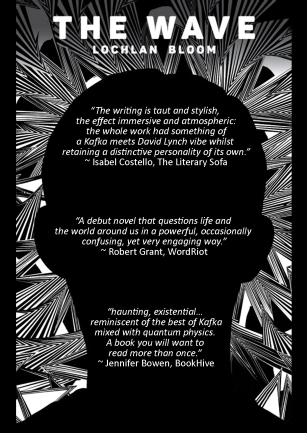 Unlike all the other literary prizes out there the NotTheBooker shortlist is voted by readers so if you are reading this that probably means you.
Unlike all the other literary prizes out there the NotTheBooker shortlist is voted by readers so if you are reading this that probably means you.
Voting closes at midnight on 14 Aug so get your vote in quick (and if you are inclined to support The Wave that would be absolutely stonking).
Here are the rules:
• choose two books from the longlist, from two different publishers
• add your vote as a comment here: https://www.theguardian.com/books/booksblog/2016/aug/02/not-the-booker-prize-very-longlist-2016-votes-please
• accompany at least one of those votes with a short review.
• It would also be very helpful if you included the word “vote”.


July 22, 2016
What’s It All About?: On Writing My Debut Novel, The Wave
A short piece on The Wave at Litro Magazine:
Before The Wave was published I assumed the task of “pitching” the novel would end the moment the book was in print. With hardback in hand, I imagined, I could simply point to the blurb on the back and let people go off to make up their own mind. How wrong I was.
Source: What’s It All About?: On Writing My Debut Novel, The Wave


April 21, 2016
London launch The Wave @Pages of Hackney, 12th May
Save the date for 12th May… The London launch event for The Wave will be at Pages of Hackney on Lower Clapton Road. An award-winning bookshop pages stocks eclectic selection of contemporary and classic fiction, children’s books, politics, art, cookery and much more so get there early to have a browse. Exact timing TBS confirmed but there will be free drinks and probably get started about 7pm-ish…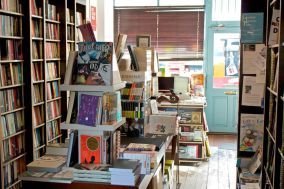
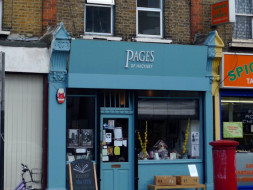



March 31, 2016
First copies of The Wave
The first copies of The Wave have arrived with Dead Ink and they are looking great.

You can order here: http://deadinkbooks.com/product/the-wave-by-lochlan-bloom/
or here: http://www.amazon.co.uk/The-Wave-Lochlan-Bloom/dp/0957698569
